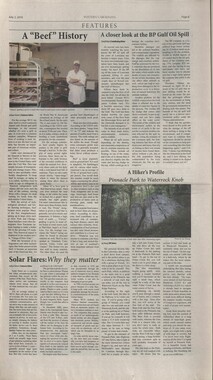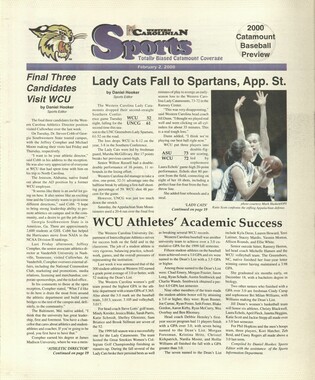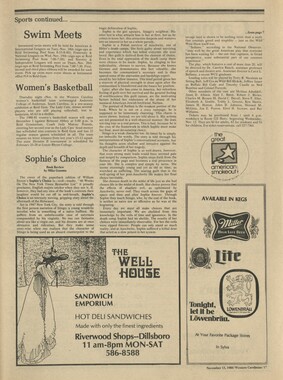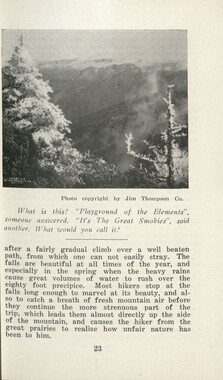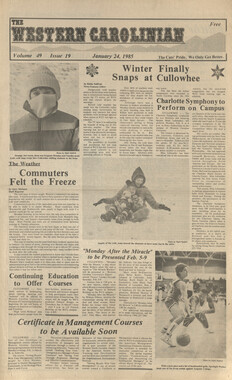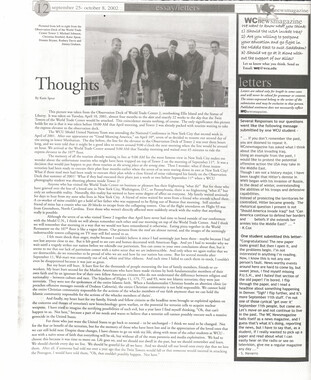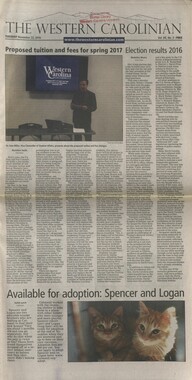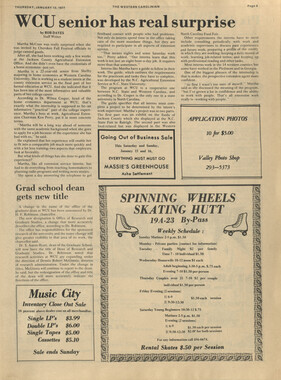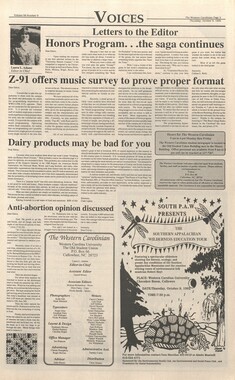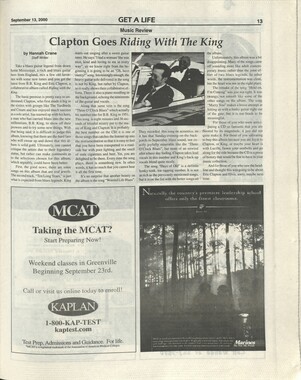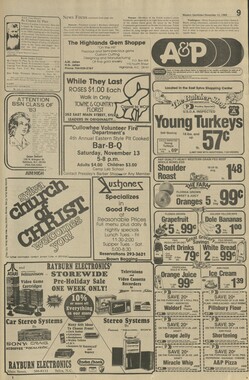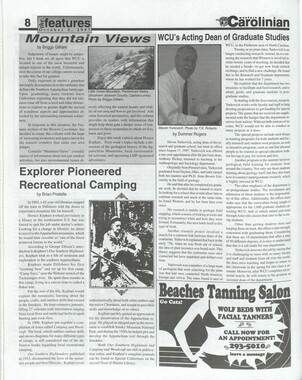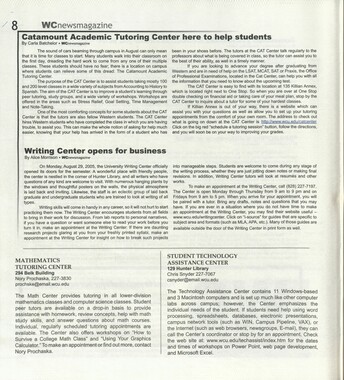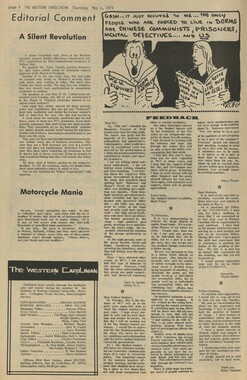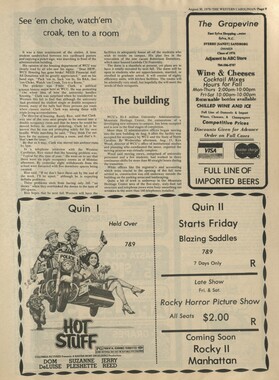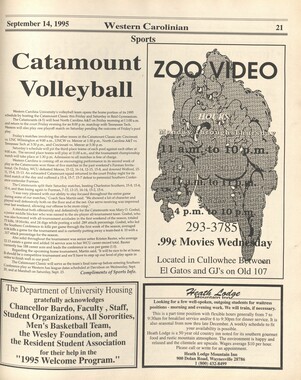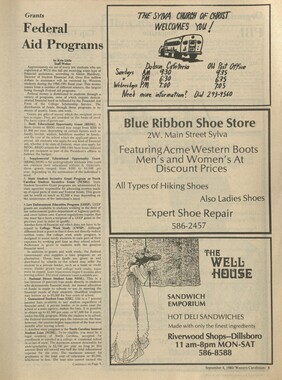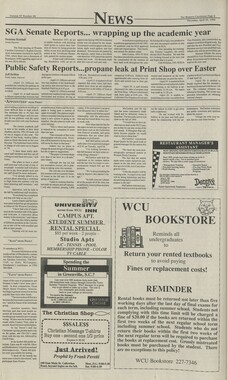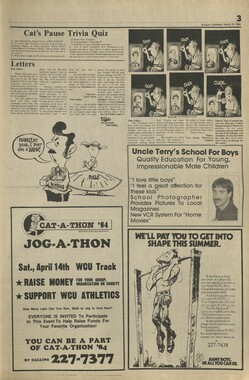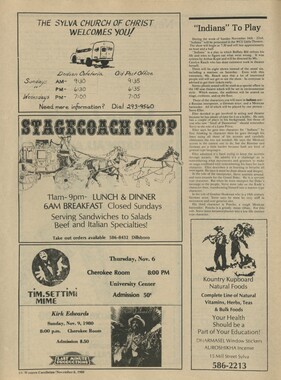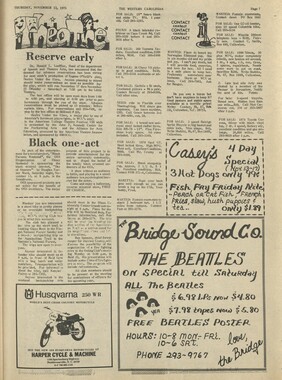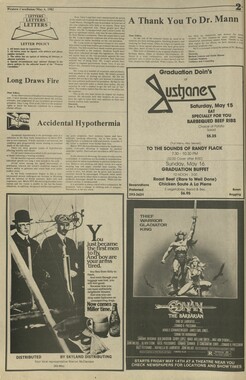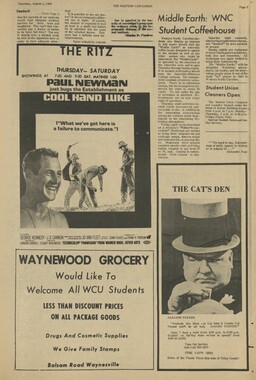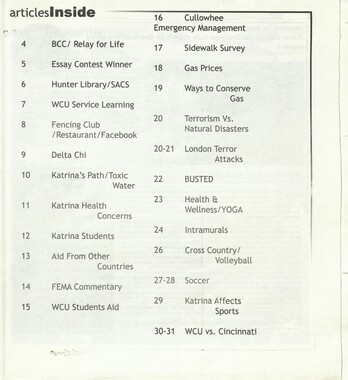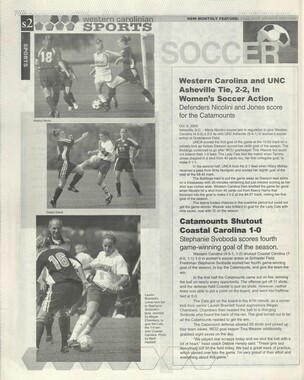Western Carolina University (21)
View all
- Canton Champion Fibre Company (2308)
- Cherokee Traditions (291)
- Civil War in Southern Appalachia (165)
- Craft Revival (1942)
- George Masa Collection (135)
- Great Smoky Mountains - A Park for America (2901)
- Highlights from Western Carolina University (422)
- Horace Kephart (941)
- Journeys Through Jackson (159)
- LGBTQIA+ Archive of Jackson County (85)
- Oral Histories of Western North Carolina (314)
- Picturing Appalachia (6798)
- Stories of Mountain Folk (413)
- Travel Western North Carolina (153)
- Western Carolina University Fine Art Museum Vitreograph Collection (129)
- Western Carolina University Herbarium (92)
- Western Carolina University: Making Memories (738)
- Western Carolina University Publications (2491)
- Western Carolina University Restricted Electronic Theses and Dissertations (146)
- Western North Carolina Regional Maps (71)
- World War II in Southern Appalachia (131)
University of North Carolina Asheville (6)
View all
- Allanstand Cottage Industries (62)
- Appalachian National Park Association (53)
- Bennett, Kelly, 1890-1974 (1463)
- Berry, Walter (76)
- Brasstown Carvers (40)
- Carver, George Washington, 1864?-1943 (26)
- Cathey, Joseph, 1803-1874 (1)
- Champion Fibre Company (233)
- Champion Paper and Fibre Company (297)
- Cherokee Indian Fair Association (16)
- Cherokee Language Program (22)
- Crowe, Amanda (40)
- Edmonston, Thomas Benton, 1842-1907 (7)
- Ensley, A. L. (Abraham Lincoln), 1865-1948 (275)
- Fromer, Irving Rhodes, 1913-1994 (70)
- George Butz (BFS 1907) (46)
- Goodrich, Frances Louisa (120)
- Grant, George Alexander, 1891-1964 (96)
- Heard, Marian Gladys (60)
- Kephart, Calvin, 1883-1969 (15)
- Kephart, Horace, 1862-1931 (313)
- Kephart, Laura, 1862-1954 (39)
- Laney, Gideon Thomas, 1889-1976 (439)
- Masa, George, 1881-1933 (61)
- McElhinney, William Julian, 1896-1953 (44)
- Niggli, Josephina, 1910-1983 (10)
- North Carolina Park Commission (105)
- Osborne, Kezia Stradley (9)
- Owens, Samuel Robert, 1918-1995 (11)
- Penland Weavers and Potters (36)
- Roberts, Vivienne (15)
- Roth, Albert, 1890-1974 (142)
- Schenck, Carl Alwin, 1868-1955 (1)
- Sherrill's Photography Studio (2565)
- Southern Highland Handicraft Guild (127)
- Southern Highlanders, Inc. (71)
- Stalcup, Jesse Bryson (46)
- Stearns, I. K. (213)
- Thompson, James Edward, 1880-1976 (226)
- United States. Indian Arts and Crafts Board (130)
- USFS (683)
- Vance, Zebulon Baird, 1830-1894 (1)
- Weaver, Zebulon, 1872-1948 (58)
- Western Carolina College (230)
- Western Carolina Teachers College (282)
- Western Carolina University (2008)
- Western Carolina University. Mountain Heritage Center (18)
- Whitman, Walt, 1819-1892 (10)
- Wilburn, Hiram Coleman, 1880-1967 (73)
- Williams, Isadora (3)
- Cain, Doreyl Ammons (0)
- Crittenden, Lorraine (0)
- Rhodes, Judy (0)
- Smith, Edward Clark (0)
- Appalachian Region, Southern (2693)
- Asheville (N.C.) (1936)
- Avery County (N.C.) (26)
- Blount County (Tenn.) (195)
- Buncombe County (N.C.) (1672)
- Cherokee County (N.C.) (283)
- Clay County (N.C.) (556)
- Graham County (N.C.) (236)
- Great Smoky Mountains National Park (N.C. and Tenn.) (519)
- Haywood County (N.C.) (3569)
- Henderson County (N.C.) (70)
- Jackson County (N.C.) (4913)
- Knox County (Tenn.) (35)
- Knoxville (Tenn.) (13)
- Lake Santeetlah (N.C.) (10)
- Macon County (N.C.) (420)
- Madison County (N.C.) (215)
- McDowell County (N.C.) (39)
- Mitchell County (N.C.) (132)
- Polk County (N.C.) (35)
- Qualla Boundary (982)
- Rutherford County (N.C.) (76)
- Swain County (N.C.) (2182)
- Transylvania County (N.C.) (270)
- Watauga County (N.C.) (12)
- Waynesville (N.C.) (86)
- Yancey County (N.C.) (72)
- Aerial Photographs (3)
- Aerial Views (60)
- Albums (books) (4)
- Articles (1)
- Artifacts (object Genre) (228)
- Bibliographies (1)
- Biography (general Genre) (2)
- Cards (information Artifacts) (38)
- Clippings (information Artifacts) (191)
- Copybooks (instructional Materials) (3)
- Crafts (art Genres) (622)
- Depictions (visual Works) (21)
- Design Drawings (1)
- Drawings (visual Works) (185)
- Envelopes (73)
- Exhibitions (events) (1)
- Facsimiles (reproductions) (1)
- Fiction (general Genre) (4)
- Financial Records (12)
- Fliers (printed Matter) (67)
- Glass Plate Negatives (381)
- Guidebooks (2)
- Internegatives (10)
- Interviews (815)
- Land Surveys (102)
- Letters (correspondence) (1013)
- Manuscripts (documents) (618)
- Maps (documents) (177)
- Memorandums (25)
- Minutes (administrative Records) (59)
- Negatives (photographs) (6090)
- Newsletters (1290)
- Newspapers (2)
- Notebooks (8)
- Occupation Currency (1)
- Paintings (visual Works) (1)
- Pen And Ink Drawings (1)
- Periodicals (193)
- Personal Narratives (10)
- Photographs (12976)
- Plans (maps) (1)
- Poetry (5)
- Portraits (4568)
- Postcards (329)
- Programs (documents) (181)
- Publications (documents) (2443)
- Questionnaires (65)
- Relief Prints (26)
- Sayings (literary Genre) (1)
- Scrapbooks (282)
- Sheet Music (2)
- Slides (photographs) (402)
- Songs (musical Compositions) (2)
- Sound Recordings (796)
- Specimens (92)
- Speeches (documents) (18)
- Tintypes (photographs) (8)
- Transcripts (322)
- Video Recordings (physical Artifacts) (23)
- Text Messages (0)
- A.L. Ensley Collection (275)
- Appalachian Industrial School Records (7)
- Appalachian National Park Association Records (336)
- Axley-Meroney Collection (2)
- Bayard Wootten Photograph Collection (20)
- Bethel Rural Community Organization Collection (7)
- Blumer Collection (5)
- C.W. Slagle Collection (20)
- Canton Area Historical Museum (2110)
- Carlos C. Campbell Collection (462)
- Cataloochee History Project (64)
- Cherokee Studies Collection (4)
- Daisy Dame Photograph Album (5)
- Daniel Boone VI Collection (1)
- Doris Ulmann Photograph Collection (112)
- Elizabeth H. Lasley Collection (1)
- Elizabeth Woolworth Szold Fleharty Collection (4)
- Frank Fry Collection (95)
- George Masa Collection (173)
- Gideon Laney Collection (452)
- Hazel Scarborough Collection (2)
- Hiram C. Wilburn Papers (28)
- Historic Photographs Collection (236)
- Horace Kephart Collection (861)
- Humbard Collection (33)
- Hunter and Weaver Families Collection (1)
- I. D. Blumenthal Collection (4)
- Isadora Williams Collection (4)
- Jesse Bryson Stalcup Collection (47)
- Jim Thompson Collection (224)
- John B. Battle Collection (7)
- John C. Campbell Folk School Records (80)
- John Parris Collection (6)
- Judaculla Rock project (2)
- Kelly Bennett Collection (1482)
- Love Family Papers (11)
- Major Wiley Parris Civil War Letters (3)
- Map Collection (12)
- McFee-Misemer Civil War Letters (34)
- Mountain Heritage Center Collection (4)
- Norburn - Robertson - Thomson Families Collection (44)
- Pauline Hood Collection (7)
- Pre-Guild Collection (2)
- Qualla Arts and Crafts Mutual Collection (12)
- R.A. Romanes Collection (681)
- Rosser H. Taylor Collection (1)
- Samuel Robert Owens Collection (94)
- Sara Madison Collection (144)
- Sherrill Studio Photo Collection (2558)
- Smoky Mountains Hiking Club Collection (616)
- Stories of Mountain Folk - Radio Programs (374)
- The Reporter, Western Carolina University (510)
- Venoy and Elizabeth Reed Collection (16)
- WCU Gender and Sexuality Oral History Project (32)
- WCU Mountain Heritage Center Oral Histories (25)
- WCU Oral History Collection - Mountain People, Mountain Lives (71)
- WCU Students Newspapers Collection (1923)
- Western North Carolina Tomorrow Black Oral History Project (69)
- William Williams Stringfield Collection (2)
- Zebulon Weaver Collection (109)
- African Americans (390)
- Appalachian Trail (35)
- Artisans (521)
- Cherokee art (84)
- Cherokee artists -- North Carolina (10)
- Cherokee language (21)
- Cherokee pottery (101)
- Cherokee women (208)
- Church buildings (190)
- Civilian Conservation Corps (U.S.) (111)
- College student newspapers and periodicals (2012)
- Dams (107)
- Dance (1023)
- Education (222)
- Floods (61)
- Folk music (1015)
- Forced removal, 1813-1903 (2)
- Forest conservation (220)
- Forests and forestry (1195)
- Gender nonconformity (4)
- Great Smoky Mountains National Park (N.C. and Tenn.) (181)
- Hunting (45)
- Landscape photography (25)
- Logging (119)
- Maps (83)
- Mines and mineral resources (8)
- North Carolina -- Maps (18)
- Paper industry (38)
- Postcards (255)
- Pottery (135)
- Railroad trains (72)
- Rural electrification -- North Carolina, Western (3)
- School integration -- Southern States (2)
- Segregation -- North Carolina, Western (5)
- Slavery (5)
- Sports (452)
- Storytelling (243)
- Waterfalls -- Great Smoky Mountains (N.C. and Tenn.) (66)
- Weaving -- Appalachian Region, Southern (280)
- Wood-carving -- Appalachian Region, Southern (328)
- World War, 1939-1945 (173)
Western Carolinian Volume 29 Number 18
Item
Item’s are ‘child’ level descriptions to ‘parent’ objects, (e.g. one page of a whole book).
-
-
Book Review 'After The Fall' Is Highly Controversial MISS TRINNA LANE Our co-ed beauty for this week is lovely Trinna Lane, a Freshman from Spindale, N. C. This 19 year old beauty stands 5'7" and has brown hair and blue eyes. Trinna is very active in school affairs and an avid fan of the Catamounts. Among her hobbies she lists reading, water skiing, and everything in general. Trinna particularly dislikes insencerity and boastfulness. Trinna is no stranger to the world of beauty. She was first runner-up in the World Queen of Posture contest held this past summer in St. Louis. A Sigma Kappa pledge, Trinna would be a charming addition to any sorority. Students Answer Should One Drink At College? DO YOU THINK THAT LEARNING TO DRINK SOCIALLY SHOULD BE A PART OF A PERSON'S COLLEGE EDUCATION WHY? Butch Lingerfelt, Belmont— Class of 1967: Yes. I feel that if a student limits his drinking to what we call "social drinking" then no harm is done and the student has learned something that will benefit him later. Of course, the student has to learn his limit so as to know when to stop. Vangie Morgan, Hendersonville—Class of 1964: No. A person who wants to learn to drink should learn in his home life and not in college. Mike Owens, Mill Spring —Class of 67: No. I feel that learning to drink is not necessary to a person's college education. Joan Waldrop, Asheville— Class of 1966: I feel that social drinking is entirely up to the individual's beliefs. Social drinking is accepted in most societies, but it is up to the individual as to when he is to become a "social drinker." Jerry Chambers, Murphy— Class of 1966: Definitely. I feel that the college should revise the curriculum to include at least a three- hour course in the art of social drinking. This is an important skill and what better place is there to learn it than in college? WELCOME, STUDENTS -TO- The College Shop ALL YOUR COLLEGE NEEDS SANDWICHES — SCHOOL SUPPLIES — Next to Joyner — BELK'S DEPT. STORE "The Home of Better Values" "Entire Line of Popular Priced Clothes For All College Students" 586-2015 SYLVA, N. C. H. J. Landis, Manager Three weeks ago the repertory company of the Lincoln Center for the Performing Arts made its debut in Greenwich Village in a theatre especially constructed for not only the U. S. third repertory company, but also for the premier of new play. Written by Arthur Miller, directed by Elia Kazan and featuring in the lead roles Jason Robards, Jr., and Barbara Loden (an exciting new Kazan discovery), After the Fall opened to a capacity crowd, with an advance ticket sale of $725,- 000,000. The play opens on a dark prosceniumless stage; there are footfalls and the lights come up to reveal a series of progressively ascending platforms bare of any furniture except for a single empty chair down front. This is the mind of a man. The players enter from beneath a bridge at the back of the stage and assume random positions, swaying in a slow, wierd tempo as though from a dream. The lights then isolate a single figure, Quentin, talking to the Thinker, who sits invisibly in the chair and is portrayed by the mind and imagination of the audience. From here the action moves through trains of thought broken by the interruptions of other people, visions of past experiences, and Rochester U Experiments Rochester, N. Y. (I.P.)— An experiment in undergraduate living centers has been initiated at the "Towers," the University of Rochester's new residence complex. Aim of the new living center for juniors and seniors is to provide upperclassmen with a transitional experience in preparation for after-college living. As a result, the facilities of the "Towers" resemble those of an adult apartment house more closely than the usual college dormitory. For example, the traditional dormitory arrangement—individual bedrooms opening on a long corridor—had been replaced by apartmentlike suites. A typical suite for six students consists of a compact living room, single and bedrooms for double occupants, bath facilities and built-in storage areas. Unlike the University's other residence halls, the "Towers" is coeducational. Currently coeds live on seven floors of the Center and men occupy 11 floors. Residence in the "Towers" is open only to junior and senior students and is, of course, entirely voluntary. A number of faculty families also live in the "Towers." Present "Towers" occupants participated actively in the various stages of planning and have worked out many of their own house rules — including strict standards of dress in the University's first carpeted dining center. To date residents have voiced enthusiastic approval of the project. Students are enjoying the opportunity to entertain fellow sudents, faculty members and campus visiors in their "apartments." periodically with conversations with the Thinker. The first of the two acts is given to an introduction cV the cast, a series of significant past events, and an occasional flowering of symbolism. First to appear is Felice, a girlish ballerina whom Quentin helped obtain a divorce and with whom he slept. There is then Holga, a blonde German archeologist who would be Quentin's third wife. Also in this dream world is Ike, Quentin's father, and Dan, his somewhat estranged brother. Also dominating the mind is a vision of Rose, Quentin's deceased mother, a powerful, domineering woman who blames her emotional husband for the loss of her stocks and money during the depression. Mickey, a fellow lawyer, Lou, a professor of law and an author, whose pro-leftist writings Quentin defends; Louise, Quentin's first wife, whom he married out of maternal association, are disclosed in the first act, too. Also appearing frequently, but without dialogue until nearly the end of the first act, is Maggie, a blonde third rate singer who is used primarily as a sex symbol. She is Quentin's second wife and appears in the first act to serve as a transition for the second, which is her act entirely. The second act, though at first dispersed with several members of the cast, is dedicated to Maggie. It is she who causes the final downfall of Quentin. Through carousings with the bottle, attempts to swallow narcotics on top of whiskey, forcing her husband to do things he ordinarily Friday, February 28, 1964 would not have done, and hurl ing snide remarks at him she completely disrupts his founda tions and by doing so provides the most dramatic scene in the play in which Quentin attempts to strangle Maggie while she is in bed. Maggie finally takes an overdose of barbiturates and is last seen dying on the floor Quentin at this time leaves her and as the play ends he is seen climbing the steps to Holga, assumed to be his third wife, while the rest of the cast is' present below. The darkness descends on the stage with him a few yards from his goal. The chief point Miller tries to convey to his audience and does so very effectively, is that man has the power to kill within him and until he realizes this face he does not know himself. After the Fall is merely a dramatic representation of this. Though many people derive the conclusion that it is Miller, and not another man on the stage, they fail to recognize the idea that it could be, and is, any man, any individual, irregard- less of mitigations. This play is a portrayal of his private life and thoughts, which few others would have had intestinal fortitude enough to admit, let alone publicly display. And while it is his private life, I am certain that many individuals know of people who have exactly the same problems. The critics' response to this new work are extremely varied. It has been rated from a "dramatic failure" to "Miller's maturest." Mrs. Lyndon B. Johnson calls the play "gripping." Despite the variance of reviews I firmly believe that Mr. Miller is to be commended for a truly modern masterpiece that is certainly "the most controversial literary contribution of the decade." Page 4 Year-Round Paradise WANTED 8 girls living in Bryson City, Cherokee, Sylva area within commuting distance of Cherokee for summer employment as waitresses in local tourist Inn. Make Application through the Student Aid Office, 119 Bird Administration Building. From the balcony, a view of coral sands and sparkling sea ... the feel of a warm and tropical sun. In the distance, the sound of a calypso band. Small wonder that Bermuda—only an hour-and-a-half from the o- U.S. by jet-is one of America's favorite year-round vacation lands. Key word for Bermuda is romantic. The capital city, Hamilton, maintains its old- world charm right alongside modern shops and facilities. A buggy ride in the city-"with your sweetheart by your side . . ." as they say in a native calypso song-is a must for every visitor. Water is never more than a mile away from any spot on the island ... and there's every kind of fishing available. Some hotels, like the Elbow Beach .Surf Club, have private beaches and pools for their vacationers. Rooms at the Elbow Beach combine the best features of living room, bedroom, and outdoor terrace. There are also Lanai suites and more secluded surfside cottages. Guests can eat breakfast and luncheon on an open terrace . . . enjoy nightly entertainment in the chic supper club. , , Among the extras the hotel offers: midnight picnics on tne beach, tennis lessons, an lo- hole golf course, and Englis bicycles-courtesy of the he Many a visiting "explorer rides a bicycle to the. nearby limestone caves filled with pin*. and white sand and uniquely- shaped stalagmites. Strangely enough, one of the caves has an almost perfect bust of Shakespeare! ,. ,,„t It's discoveries like this that make Bermuda the complete island paradise for Americans of every age.
Object
Object’s are ‘parent’ level descriptions to ‘children’ items, (e.g. a book with pages).
-
The Western Carolinian is Western Carolina University’s student-run newspaper. The paper was published as the Cullowhee Yodel from 1924 to 1931 before changing its name to The Western Carolinian in 1933.
-
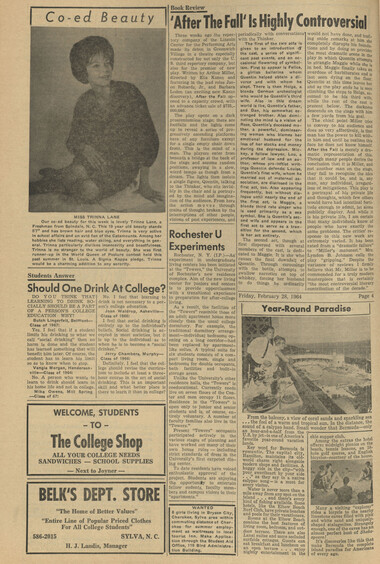

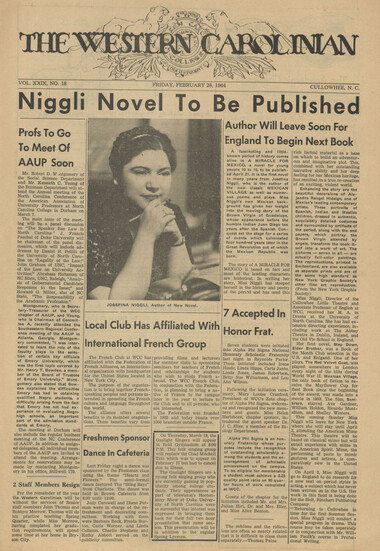
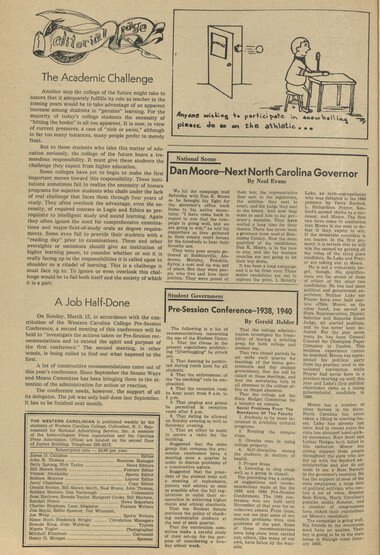
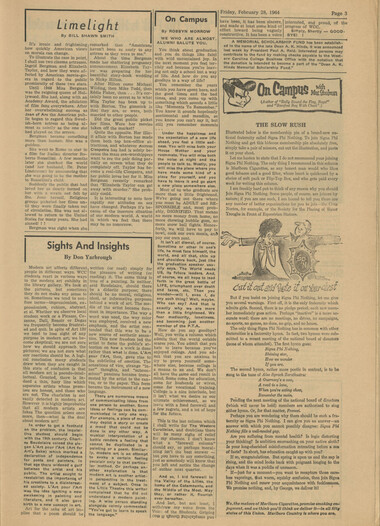
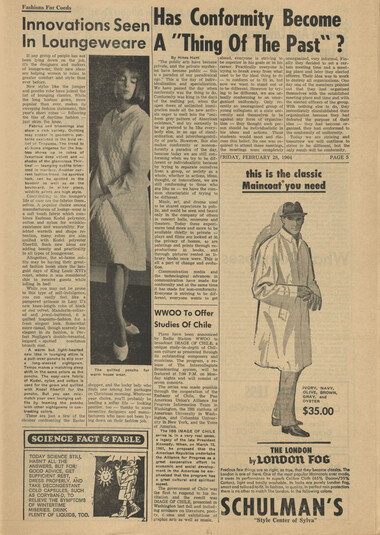
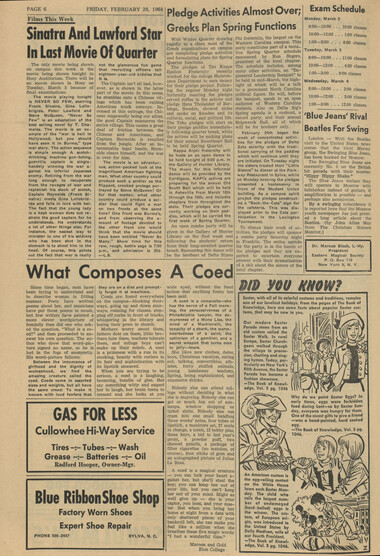
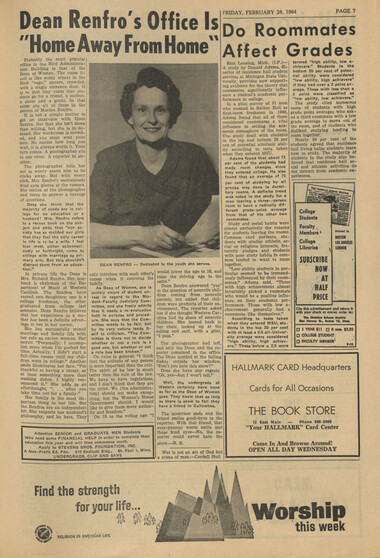
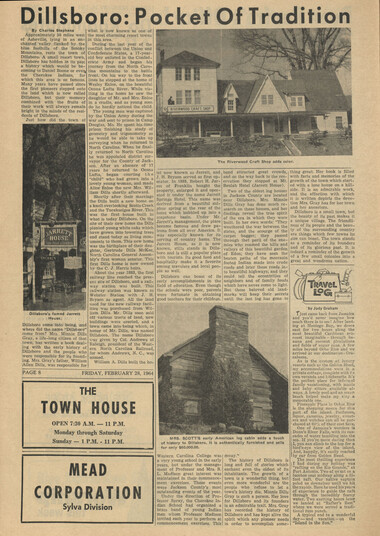
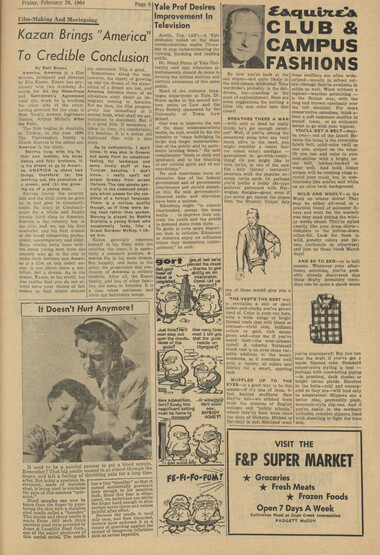
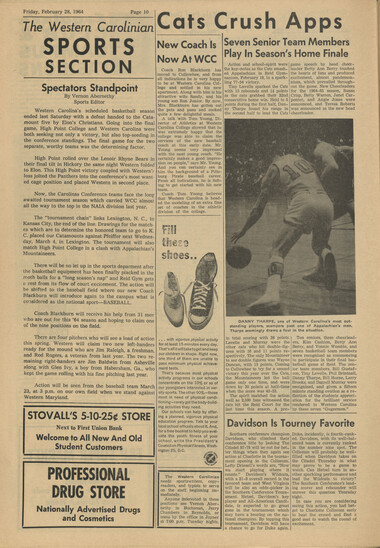
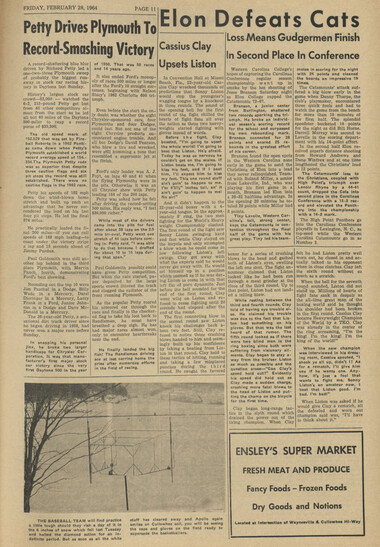
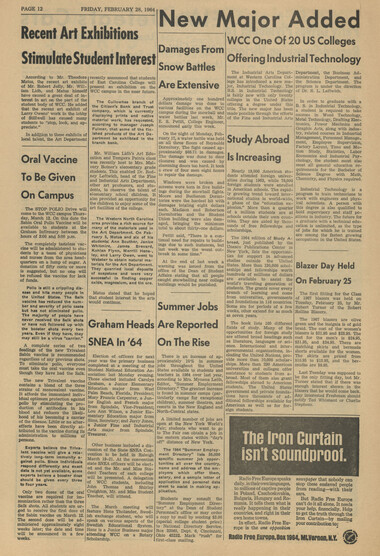

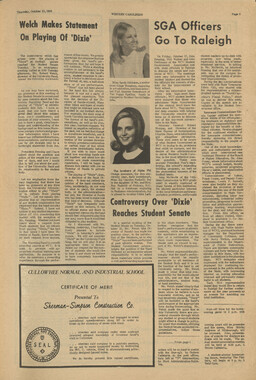


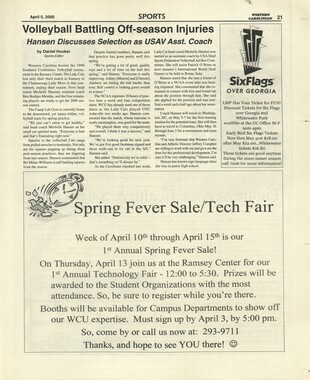
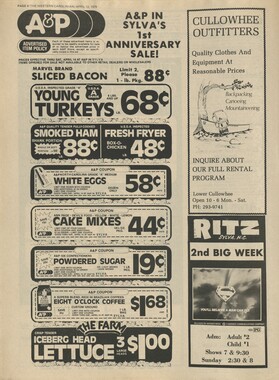
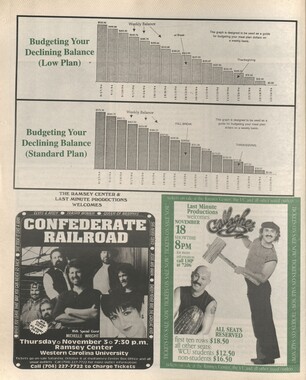
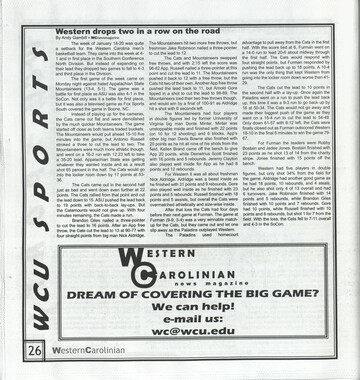
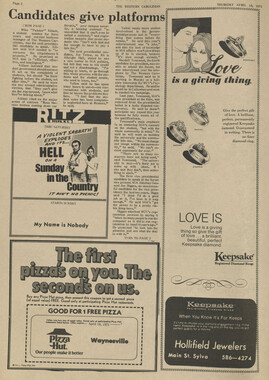
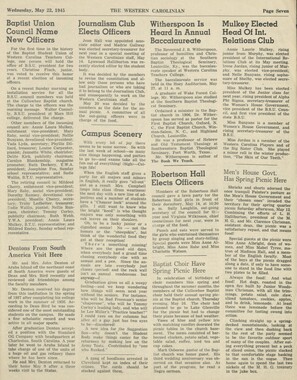
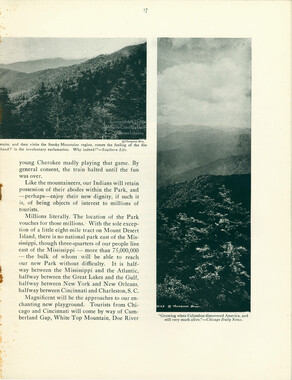
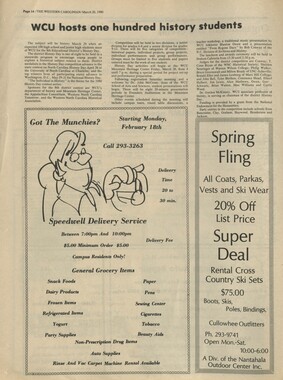
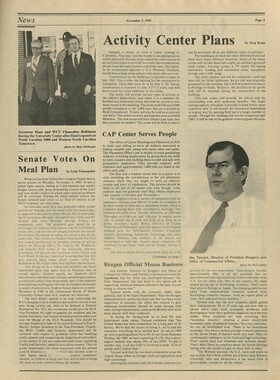
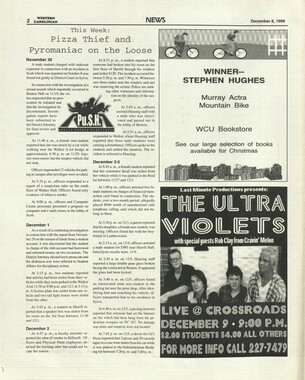
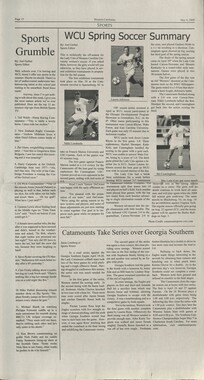
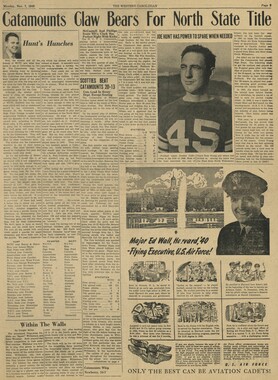
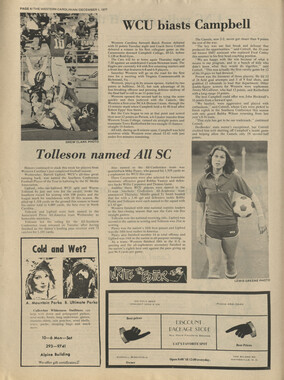
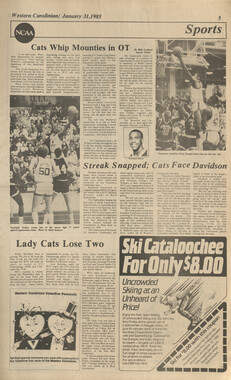
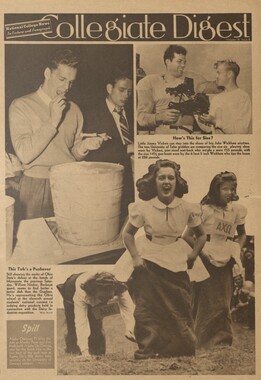
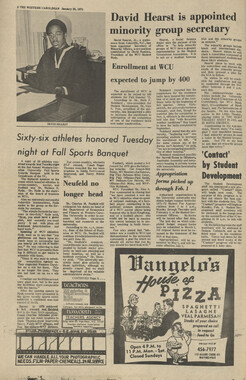
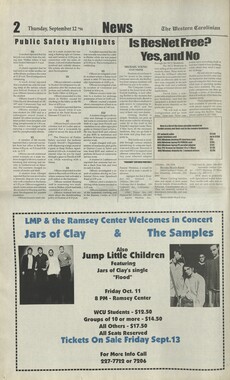
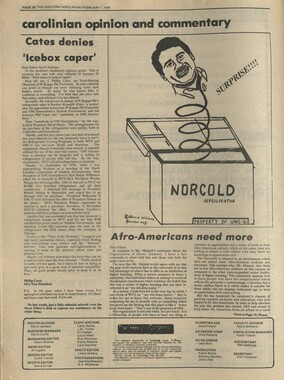
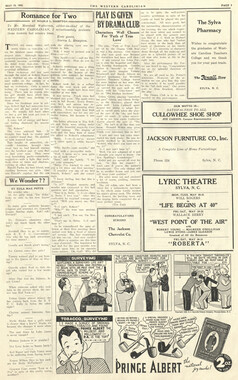
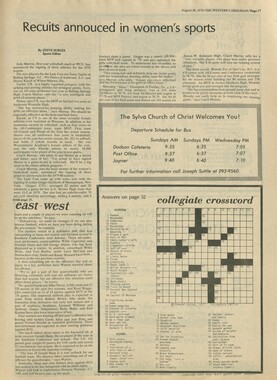
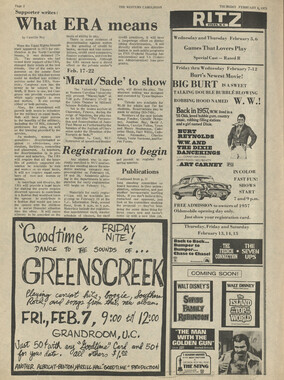
![hl_westerncarolinian_2008-09-26[10-27]_vol74_no03[04]_08.jpg](/media/w400h300/wcu_publications/hl_westerncarolinian_2008-09-26[10-27]_vol74_no03[04]_08.jpg)
